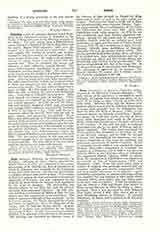

Zimmer, PATRICK BENEDICT, philosopher and theologian, b. at Abtsgemund, Wurtemberg, February 22, 1752; d. at Steinheim near Dillingen, October 16, 1820. He studied the Humanities and philosophy at Ellwangen, theology and jurisprudence at Dillingen; was ordained priest, April 1, 1775; became repetitor of canon law at the College of St. Jerome at Dillingen in 1777, and professor of dogmatic theology at the University of Dillingen in 1783; in 1791 also pastor of Steinheim. In 1795 he was dismissed from the faculty of the university, ostensibly because as pastor of Steinheim he should reside at that place, but, in reality, because he was an extreme idealist. In 1799 he was appointed professor of dogmatic theology at the University of Ingolstadt, and when this university was removed to Landshut the following year, he was transferred thither in the same capacity.
Though Zimmer rendered great service to the Church and religion by his fearless and successful combat against the Kantian Rationalism which was prevalent at Ingolstadt, he was himself a passionate adherent of the idealistic pantheism of Schelling, without, however, compromising his Catholic conviction in practice. To lessen the danger of inculcating his philosophical tenets in his lectures, he was relieved of the professorship of positive theology and given that of Biblical archaeology and exegesis in 1807. In 1819 he became rector of the university and deputy to the Second Chamber of the Bavarian Parliament. His chief theological work, “Theologise christianw specialis et theoretical” (4 parts, Landshut, 1802-6), is to a great extent permeated with Schellingian pantheism. His other noteworthy works are: “Dissertatio dogmatica de vera et completa potestate ecclesiastica illiusque subjecto” (Dillingen, 1784); “Fides exsistentiae Dei” (Dillingen, 1791); “Philosophische Religionslehre: part I. Lehre von dem Absoluten” (Landshut, 1805); “Philosophische Un-tersuchung fiber den allgemeinen Verf all des menschlichen Geschlechtes” (Landshut, 1809); “Untersuchung fiber den Begriff and die Gesetze der Geschichte etc.” (Munich, 1817).
MICHAEL OTT

